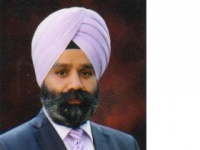Chandigarh IFA, Iqbal Singh is an alumnus of Wharton Business School and Indian Business School, Hyderabad. After pursing MBA Finance from IBS, he joined HDFC bank as investment advisor in 1999.
In 2003, Iqbal joined Citi Bank as Investment Counselor. His key responsibilities were wealth management - investment and insurance advisory.
During his tenure with HDFC and Citi, he used to manage HNIs clients across North India. Over the years, he built good rapport with clients. This gave him the confidence to start on his own. In 2004, Iqbal founded his financial advisory firm ‘Innovative consultants’ and he managed to shift many of his old clients.
From the beginning, Iqbal decided to offer multiple products like mutual funds, direct equity, properties, AIFs and PMS and services like tax planning and estate planning. Iqbal believes that HNIs like to work with advisors who go beyond mutual funds and offer value added services.
Gradually, Iqbal grew his HNI client base to 200 through referrals. Talking about he asks for referrals, Iqbal said that he usually asks for feedback from his clients. Most of the time, he gets positive response from clients and clients themselves ask him if they can do something for him. He then asks for at least two referrals.
Initially, Iqbal was not keen on doing business with retail investors. However, after queries from a large number of walk-ins, he saw an opportunity in serving retail investors too and started a separate division for them. Very soon through word of mouth and referrals, Iqbal acquired many retail investors in Chandigarh. Over the last 15 years, his retail client base has increased to 10000.
Talking about his onboarding process, Iqbal said that he first understands the client’s mindset before working with them. According to him, one-size fits all approach to deal with clients does not work in advisory business. Iqbal has prepared a questionnaire with the help of a psychologist to gauge their mindset. To assess the aptitude of the clients, the questionnaire includes psychometric questions like ‘You are on a game show and have won Rs.5 lakh. Now, you can either quit, or play more as follows. What would you do?
Based on the score, Iqbal categorizes his clients as conservative, balanced, aggressive and very aggressive. He makes clients take this test every year to see if their risk appetite has changed. This helps Iqbal and his team to customize their approach.
Another rule that Iqbal follows is not talking to clients about products and returns. In the first few meetings, he focusses on educating his clients about financial products and the risk associated with them.
Iqbal has a team of relationship managers who regularly stay in touch with his clients. Each RM meets at least five clients a day.
In 2008, Iqbal Singh went to Wharton Business School to pursue a diploma in investment management to increase his knowledge.
To expand his business, Iqbal has launched his own PMS for wealthy clients in 2019. Sharing the rationale for launching PMS, he said, “Most advisors have faced a situation where they have had to deal with clients whose funds have underperformed their benchmarks. Hence, we decided to launch our own PMS. We charge an expense ratio of 1% with a performance linked fees of 20% if our PMS delivers returns in excess of 10%. Currently, our PMS has AUM of Rs. 25 crore but given the positive response from investors, I believe that in the next 6 months, we will be able to make it Rs.100 crore PMS. We have a dedicated team of research analysts and fund managers to manage our PMS. In the last 10 months, our PMS has beaten the Nifty50 benchmark by a wide margin.”
Iqbal now manages assets worth Rs.1,000 crore across various financial products. Currently, 90% of his business comes through HNI clients. As of now, 50% of the assets is in equity/balanced products, 40% is in debt and 10% in money markete. He has a team of 30 across functions such as research, training and education, real estate consultancy and operations.
Takeaways
- Dealing with multiple products and diversifying services to increase income
- Institutionalizing practice by appointing team and creating separate desk for HNIs and retail investors
- Staying in constant touch with clients
- Understanding the client’s mindset before working with them






